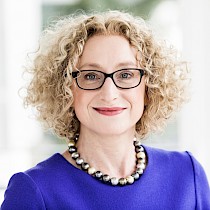Prof. Dr. Dr.-Ing. Jivka Ovtcharova

Jivka Ovtcharova is Head of the Institute for Information Management in Engineering at the Karlsruhe Institute of Technology (KIT) and Director for Process and Data Management in Engineering in the field of Intelligent Systems and Production Engineering at the Research Center for Computer Science (FZI) in Karlsruhe. Born in Bulgaria, she studied mechanical engineering and automation in Sofia and Moscow and worked at the Bulgarian Academy of Science, the Fraunhofer Gesellschaft and the automotive industry at the inspiring interplay between engineering and computer science. In the virtual age, she draws a line between the liberation of the human spirit during the Renaissance and the Internet of Things, which she believes should be understood as an "Internet of the senses". At the center of her work is the Resourceful Human and its role in the all-encompassing digital transformation of the economy and society. Prof. Ovtcharova is founder of a Lifecycle Engineering Solutions Center (LESC) where new ideas in virtual worlds can be implemented quickly and underpinned by far-reaching publicity measures, as well as an "Industry 4.0 Collaboration Lab" - an open platform for action on digitization, education and qualification as one of the 100 excellent places for Industry 4.0 in Baden-Württemberg. Her recent project is called CAIT “Center for Artificial Intelligence Talents”.
The professor with a double doctoral degree in mechanical engineering and computer science is one of the 25 women for the digital future in Germany and a winner of the first Inspiring Fifty DACH Award 2019. Jivka Ovtcharova is a regular key note speaker, a member of the Senate of Economy Europe and various committees for digitization and AI, i.e. of the AI-42 Market Intelligence Ltd.
Synopsis
Augmented Intelligence for expanding Model Reality
The triplet of Artificial Intelligence, Humans, and Technologies (acting in reality and reality-like environments), is a system of systems-type construct, spanning an unprecedented scale. The study of such constructs presents a number of novel challenges that have not been addressed, or even acknowledged, in the mainstream research on AI and related areas. Expanding the models in their environment means that humans, reality (physics), data (virtual), machines and algorithms live and interact with each other to solve real-world problems.
All Speakers
- Refik Anadol
- Thorsten Bauer
- Prof. Stefanie Betz
- Prof. Ina Conradi Chavez
- Mark Chavez
- Florian Dohmann
- Dan Haab
- Dr. Lily Hibberd
- Prof. Jeroen van den Hoven
- Professor J. Stephen Lansing
- Mathew Lawrence
- Prof. Jason Edward Lewis
- Roman Lipski
- Dr. Sebastian Meier
- Prof. Galina Mihaleva
- Dave Murray-Rust
- Prof. Dr. Dr.-Ing. Jivka Ovtcharova
- Gülsel Özkan
- Dr. phil. Dipl.-Ing. Oliver Parodi
- Ludger Pfanz
- Thea Riofrancos
- Dr. Matthias Röder
- Seda Röder
- Prof. David Rolnick
- Prof. Rasa Smite
- Dr. Christoph Schneider
- Dr. Markus Schmidt
- Kathleen Schröter
- Prof. Vibeke Sorensen
- Holger Volland
- Prof. Victoria Vesna
- Prof. Charles Wang
- Yulu Wang
- Daniel Walther
- Prof. Dr. Steffen P. Walz
- Pawel Wargan
- Elizabeth Wathuti
- Prof. Dr. Marion Weissenberger-Eibl
- Wang Zhigang PH.D
Contact
Interesse? Fragen?
Schreiben Sie uns:
info@beyond-festival.com




